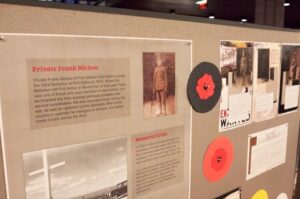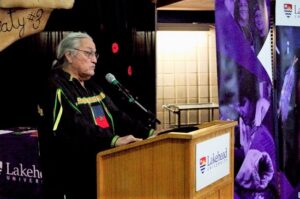Lakehead University honours Indigenous Veterans

By Rick Garrick
THUNDER BAY — Fort William Councillor Michele Solomon stressed how First Nations veterans lost their treaty rights during Lakehead University’s Indigenous Veterans Day ceremony on Nov. 8 at the Agora on the Thunder Bay campus.
“After serving, they were disenfranchised — what that means is they no longer belonged to their community,” Solomon says. “I can speak for my own grandfather on my paternal side and his brothers, after serving, you come back to your country and you’re no longer a [citizen] of that First Nation, you’re no longer considered an Indian under the Indian Act.”
Solomon says that is just one aspect of the colonized experience of Indigenous people.
“That’s just one little piece of it that speaks to how we were removed from our communities and removed from our homelands and how we no longer belonged,” Solomon says. “You can imagine how that trickled down to future generations, and actually changes continue to happen to try and correct the injustices that happened through the Indian Act over the years. But I think that not belonging really needs to be echoed.”
Solomon adds that she wants to take a moment to acknowledge all those who served and all those who are still in service.
“I want to acknowledge the family members, and loved ones of those who served and particularly those who lived additional stressors and traumas because of this not belonging anymore, the impact that had on your family and your loved one who served,” Solomon says. “And I also want to say how grateful I am that Lakehead University has taken up the responsibility to have this exhibit (featuring photos and artifacts of Treaty #3, Robinson Superior Treaty 1850 and Métis veterans) here today so we can come together and acknowledge this day in such a powerful way.”

Mattagami Elder Gerry Martin, a Canadian Forces veteran, says he joined the Canadian Forces in 1966 when he was 17-years-old.
“We were young and impressionable and wanted to do what was right,” Martin says. “For us Nish, we just wanted to show them, ‘I can shoot, I can hunt, just give me a good rifle and I’ll show you.’ Many of us Nish were sharpshooters, and crawling around in the bush and through the forest is nothing, it’s like chasing a deer or moose. Sleeping out on the ground under a lean-to, that’s like being out on the hunting ground, trapping, living off the land, it wasn’t so hard.”
Martin says each of the veterans have their own memories, noting that he served with the artillery.
“And we thank God, the Creator, the deity, that we made it through it and we’re still alive,” Martin says. “And hope that this country and the world doesn’t see another major war of the world. Have we not learned yet to live in peace? Because that’s what our Nish [teaching] is — to live in peace and harmony with all of creation.”
Martin says this time of the year is hard for him and other veterans.
“I’ve buried a couple of my buddies,” Martin says. “It’s just something you carry with you, and I don’t think people in Canada, the public, really understand what has been lost. But the families, they remember, they hear grandpa or maybe grandma crying about it still, the buddies and chums they lost. So let’s pledge ourselves to live in peace and harmony with all of creation.”
The Indigenous Veterans Day ceremony also included presentations by Lakehead University officials and representatives from a range of organizations including the City of Thunder Bay.


